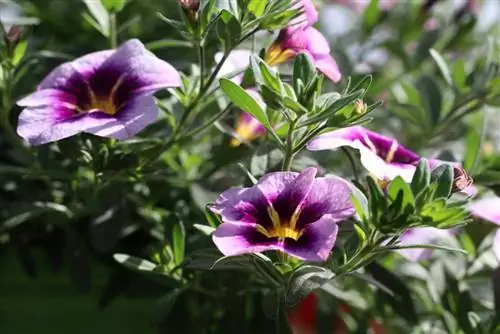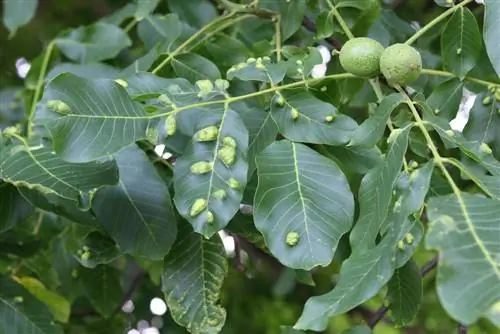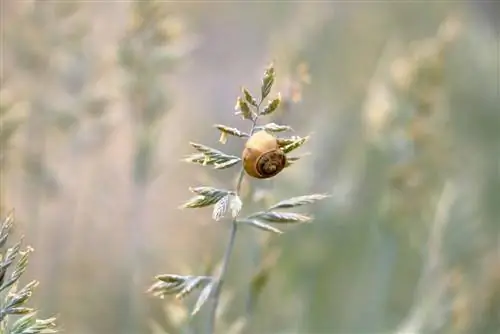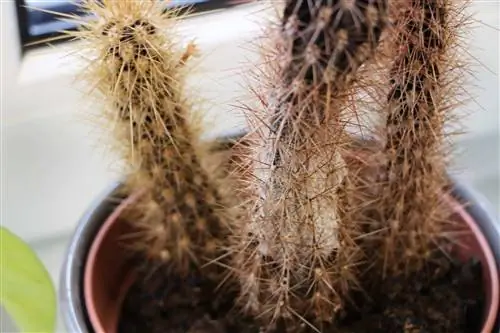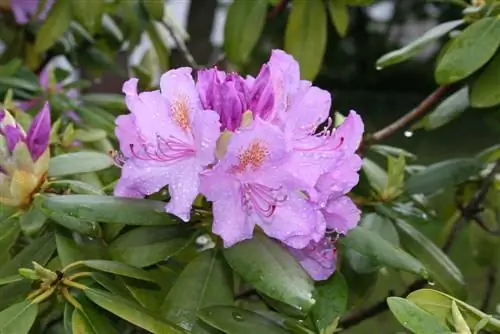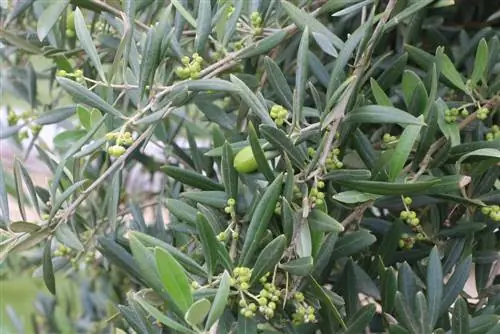- Author admin [email protected].
- Public 2023-12-17 03:39.
- Last modified 2025-06-01 06:48.
It is important to make sure that the location is right, that the soil has the right composition and nutrients and that it is watered and fertilized sufficiently, but not too much. Of course, diseases and pests can still occur, but he althy and strong plants can simply defend themselves better. Read about which pests and pathogens can affect petunias, how to prevent them and how you can help your plants.
Short profile of petunias
- Originate from South America
- On offer almost exclusively hybrids
- Annual, although they can also be overwintered
- Need a lot of sun and warmth
- A place as sheltered from wind and rain as possible
- Need plenty of space in the container
- Humose potting soil
- Water regularly
- Don't like dryness or waterlogging
- Fertilize every 7 to 10 days - phosphorus-focused
- Remove dried flowers regularly
Petunias - Diseases
Petunias bloom for a long time and profusely, but they need ideal conditions. If they are too wet or too dry, this affects the he alth of the plants. Rot is probably the most common disease in petunias. This is often because the plants are not under a roof and often get wet. They just don't tolerate it well. But they are often simply watered too much. The earth is too wet and cannot dry out in the meantime and this also causes rot to form, even quite quickly. Mildew is another problem. Many plants are attacked by the fungus responsible. However, if you recognize it in time, you can easily take countermeasures. Chlorosis, which can also occur from time to time, can be easily prevented. But they are also easy to put down. Otherwise, petunias are not particularly sensitive. There are not many diseases that affect them.
Mildew - usually powdery mildew
Mildew is quite common on petunias. Often it is due to the weather, but incorrect care can also lead to an infestation. It occurs more frequently when the plants are exposed to wind and weather. Fortunately, powdery mildew is the more harmless of the two main species that occur here. The fungus settles on the surface and does not penetrate the plant. It can also be easily combated with harmless home remedies. Things are different with downy mildew. Powdery mildew can be recognized by a whitish, flour-like coating that can affect all parts of the plant. The infestation often begins on the leaves and spreads from there. The simplest solution is to make a mixture of 9 parts water and 1 part milk. This is sprayed over the petunias from all sides. It is important to do this at the first sign of infestation. If the disease spreads, this mixture is usually no longer sufficient. Then the petunias have to be removed frequently. Of course, there are also chemical preparations against mildew. The sooner these are used, the better. If the fungus has already spread too much, these remedies are no longer really helpful.
- Whitish, flour-like coating on all parts of the plant
- Water-milk mixture
- Plant protection products
- Remove infected parts
- In an emergency, remove the entire plant
Root neck rot
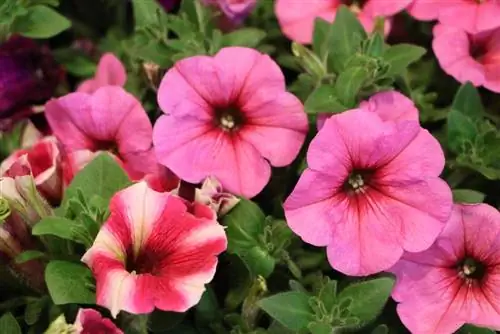
This rot disease is transmitted through plant soil. There's not much you can do about it. The disease can be recognized by the fact that the base of the stem and the upper root area turn brown or black. The plants wilt and die. This must be recorded as a loss. It is important to replace all of the soil before replanting. The plants must be destroyed and do not belong in the compost. You can help he althy plants by spraying them with horsetail broth when it rains constantly.
- Stem base and upper root area brown or black
- Destroy plants
- Replace complete earth
Chlorosis
There are different types of chlorosis. Yellowing of leaves occurs on petunias. The young leaves are affected first. This is usually due to a lack of iron. Foliar fertilization can help, although wet leaves on petunias should be avoided. Stone powder can also help with iron deficiency. For potted plants, it can be helpful to replace the soil in the box or container. It also makes sense to boil the water for irrigation. Soft water from the tumble dryer is also suitable. Specialist retailers offer special soil for petunias, which has a higher iron content. This prevents chlorosis in plants right from the start.
- Chlorosis - iron deficiency
- Leaf yellowing
- First on young leaves
- Add foliar fertilizer or stone powder
Petunias need nutrients to grow he althy and strong. Good care alone is not enough. They are heavy eaters. It is important to use a phosphate-based fertilizer. To prevent iron deficiency, it is recommended to use special petunia soil or regularly fertilize the leaves with iron fertilizer. He althy plants are more resilient and robust and can defend themselves better against pathogens.
Petunias - pests
Unfortunately, you often get pests when you buy something. It is therefore important to pay attention to he althy and pest-free plants. If the smallest unclear spots or living creatures appear on the plants, leave them alone! You save yourself a lot of trouble. When it comes to pests, it is mainly aphids and whiteflies that cause problems for petunias. But both can be fought well. you don't even have to use chemistry.
Aphids
Petunias are one of the favorite plants of aphids. They are attacked frequently and then in large numbers. They can be recognized by the curled or discolored leaves and plant parts. In addition, honeydew is a clear sign of aphid infestation, which is the excretions of the insects. You can notice shiny spots on the leaves or, in the case of potted plants, sticky spots on the ground around the container. Honeydew is an ideal breeding ground for fungal spores, so that fungi can settle and further weaken the plants. The delicate petunia flowers eliminate the need for the very effective control method of simply rinsing off the pests with a sharp jet from the water hose. That would cause more harm than help. It is then cheaper to use an old home remedy, the water and dishwashing liquid solution. You use a spray bottle and fill it with water. Add a few drops of dishwashing liquid or, alternatively, a few shaved shavings of curd soap. Under no circumstances should the concentration be too high. Spray the plants from all sides with this solution, especially under the leaves, because that is where the pests like to sit. The process has to be repeated after a few days, usually again. A mixture of water, rapeseed oil and a splash of dish soap works similarly to ensure that the ingredients combine. For coffee drinkers, it is a good idea to spread coffee grounds on the ground around the plants. This not only helps against aphids, this waste product also serves as plant fertilizer.
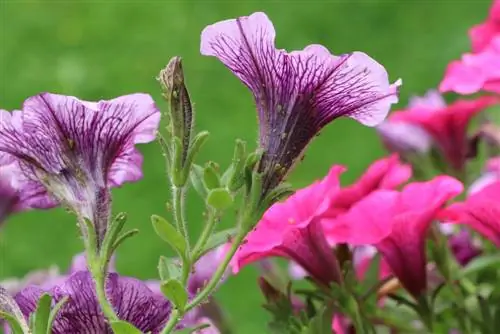
Stinging nettle decoction also has two good properties. Not only does it help against pests, it also strengthens the plants. To do this, fill a 10 liter bucket with freshly cut nettle herb and add water. Let everything stand for a day or two (never longer, otherwise it won't work) and then spray the drained broth undiluted over the plants. If you are bothered by the smell, all you have to do is add some rock dust over the whole thing and the unpleasant smell will be gone. Of course, there are also chemical control agents, but these are actually superfluous, especially for anyone who wants to live without chemicals in their garden or on the balcony.
- Identified by curled leaves and yellow leaves and plant parts
- Clear sign also honeydew
- Home remedies to combat it
- Water with a little detergent for spraying
- Alternative curd soap
- Water-rapeseed oil-dishwashing liquid-solution
- Coffee grounds - fertilizer at the same time
- Stinging nettle broth - also for strengthening plants
Whitefly
The whitefly is also quite common on petunias. The small whiteflies, which rise in masses at the slightest touch of the plants, so that it looks as if they are jumping away, suck plant sap. Since they occur in large quantities, they can cause quite a bit of damage, which will severely weaken petunias. In addition to being touched, the insects can also be recognized by yellow spots on the leaves and also by honeydew. Yellow signs are helpful, but not in the case of mass infestations. The bright yellow panels attract insects and they stick to the very sticky surface. If the infestation is severe, the panels would have to be changed every few hours because they are too full. Rain is bad for stickers. They dissolve. They work best under a roof. Plant protection products also help to clarify the problem. So if you don't necessarily want to do without chemicals, you can try it like this. Systemic remedies have proven to be particularly effective. These are administered in liquid form and absorbed by the petunia roots. The active ingredients are passed through the entire plant. The sucking insects pierce the plant and suck out the poison along with the plant sap. That was it.
- Identifiable by sooty mold, yellow spots on the leaves
- When touched, numerous small flies fly up
- Yellow boards
- Plant protection products
- Systemic agents
Tip:
For both pests, it makes sense to remove the leaves contaminated by honeydew, as sooty mold fungi tend to colonize on them and this further weakens the plants. In addition, when spraying solutions with dishwashing liquid or soap, you should make sure that the floor is covered so that the liquid does not penetrate into the potting soil.
Conclusion
Petunias are great flowering plants. With a good location, ideal substrate and sufficient water and nutrients, they will delight you for months, whether in a balcony box, a planter on the terrace or planted out (not ideal) in the garden. However, diseases and pests can occur despite the best conditions and care. It is important to recognize the first signs and intervene early before pests or pathogens spread too far. In principle, all diseases are easy to combat and pest control doesn't require much effort. All in all, the petunia is highly recommended.

